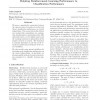Free Online Productivity Tools
i2Speak
i2Symbol
i2OCR
iTex2Img
iWeb2Print
iWeb2Shot
i2Type
iPdf2Split
iPdf2Merge
i2Bopomofo
i2Arabic
i2Style
i2Image
i2PDF
iLatex2Rtf
Sci2ools
125
click to vote
ICML
2005
IEEE
2005
IEEE
Relating reinforcement learning performance to classification performance
We prove a quantitative connection between the expected sum of rewards of a policy and binary classification performance on created subproblems. This connection holds without any unobservable assumptions (no assumption of independence, small mixing time, fully observable states, or even hidden states) and the resulting statement is independent of the number of states or actions. The statement is critically dependent on the size of the rewards and prediction performance of the created classifiers. We also provide some general guidelines for obtaining good classification performance on the created subproblems. In particular, we discuss possible methods for generating training examples for a classifier learning algorithm.
Binary Classification Performance | Classifier Learning Algorithm | ICML 2005 | Machine Learning | Unobservable Assumptions |
Related Content
| Added | 17 Nov 2009 |
| Updated | 17 Nov 2009 |
| Type | Conference |
| Year | 2005 |
| Where | ICML |
| Authors | John Langford, Bianca Zadrozny |
Comments (0)

